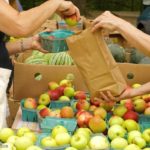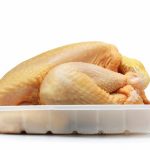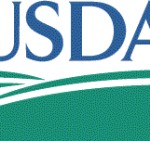Learn how to stay food safe while shopping Farmers Markets with tips from the USDA. These markets are available seasonally and year round across the country. You can buy fruits, vegetables, meats, cheeses, and beverages, as well as prepared foods in some states. The first tip is to watch the temperature. Perishable foods should be out of refrigeration no longer than two hours, and that time shrinks to one hour if the ambient air temperature is 90*F or higher. Bacteria can double in a food in 20 minutes when the food is not refrigerated. Look for vendors who display perishable items like soft cheeses and raw meats on ice, in a cooler, or with refrigeration. And if you intend to buy these foods, bring an insulated bag or cooler with cold sources such as gel packs, ice, or frozen … [Read more...]
Farmers Market Food Safety Helps Prevent Foodborne Illness
It's National Farmers Market Week. That means it's also time to focus on Farmers Market food safety. When you visit a farmers market, you can find the freshest produce and sometimes meats and eggs, and you can learn more about these products and how to cook them. But you must remember that any food, even vegetables and leafy greens, can be contaminated with pathogens that can make you sick. There are more than 8,000 farmers markets across the country. During the COVID-19 pandemic, farmers markets were an essential source of health food for many communities. But how safe is the food you buy at farmers markets? It depends. There are some warning signs to look for and ways to protect ourself. Most farmers markets do not offer food washing stands, so it's a good idea to bring … [Read more...]
Study Finds Low Level Contamination on Farmers Market Food in CA
A study conducted by the University of California Davis has found that there is low level contamination on farmers market produce and meat in Northern California. While the bacterial level is low, there is still "cause for some concern." The study was published in the Journal of Food Protection. Researchers looked at the prevalence of Salmonella bacteria on meat and produce, as well as generic E. coli on produce, which indicates possible fecal contamination. Samples were taken from 44 certified Northern California farmers markets. They found that less than 2% of animal products sampled, including beef, poultry, and pork, teated positive for Salmonella, while all produce tested negative. But slightly more than 30% of produce did test positive for generic E coli. Lead author … [Read more...]
Shop at Farmers Markets This Year With COVID-19 Precautions
The Minnesota Department of Agriculture (MDA) is telling consumers that they will be able to shop at farmers markets this year as long as some precautions for the COVID-19 pandemic are taken. Because the markets are typically held outside, the risk for virus transmission is reduced. Minnesota Farmers Markets are an essential business so they can remain open through any quarantine closures. MDA has published a guide called Shopping the Farmers' Market During COVID-19 to help consumers stay safe. The advice is sensible and includes information we have been told before. First, stay home if you are sick. That's always important, but especially so now during the pandemic. Wash your hands before and after visiting the market. The farmers' market you visit may provide handwashing … [Read more...]
Chickens From Farmers Markets May Have More Pathogenic Bacteria
A study conducted at Penn State has found that raw, whole chickens from farmers markets throughout that state had "significantly higher levels of bacteria that can cause foodborne illness compared to those purchased from grocery stores in the region." Out of 100 whole chickens purchased at farmers markets, 90% tested positive for Campylobacter and 28% for Salmonella. During the same time period, 28% of raw, whole, organic chickens bought at grocery stores had Campylobacter, and 20% tested positive for Salmonella. And 52% of raw, whole, non-organic, conventionally processed chickens from grocery stores had Campylobacter and 8% had Salmonella bacteria. Dr. Catherine Cutter, professor and food safety extension specialist at the University, said, "some people believe that local food is … [Read more...]
Shopping at a Farmers Market This Weekend? Buyer Beware.
Farmers markets are booming. In the last 40 years, farmers markets around the country have grown by 2000% as demand for local foods has increased. Farmers markets generating at least $1.3 billion in consumer spending every year. We all know that foods purchased directly from the farmer are fresher, taste better, and are more nutritious. But how safe are those foods? State and local laws about these temporary establishments vary, since each state has its own farmers market regulations. Some vendors are completely exempt from health department inspections, others sell food prepared in uninspected homes, and some farmers markets are inspected by authorities. A study published in Food Protection Trends found that food safety behaviors by vendors at farmers markets are inconsistent at … [Read more...]
USDA Aims To Make Shopping At Farmers Markets A SNAP
Shopping at farmers’ markets this summer will get a little easier for some families participating in the Supplemental Nutrition Assistance Program (SNAP) thanks to a $4 million grant from the U.S. Department of Agriculture (USDA). The USDA’s goal is to expand the availability of wireless point-of-sale (POS) equipment in farmers’ markets not currently participating in SNAP to make it easier for shoppers to redeem their benefits electronically. About 1,500 of the 7,100 farmers’ markets nationwide currently use electronic benefit transfer, and SNAP purchases at farmer’s markets have increased 400 percent of the last four years, according to the USDA. "This funding will help SNAP customers increase their opportunities to access healthy, local foods," Kathleen Merrigan, USDA deputy … [Read more...]








